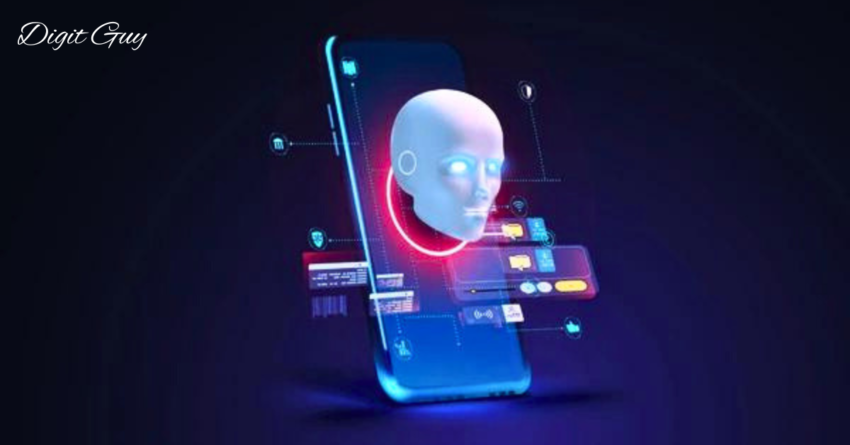Artificial Intelligence (AI) is a transformative force in the world of mobile technology, driving innovation and redefining user experiences.
From enhancing smartphone capabilities to enabling advanced applications, AI has become an integral part of our everyday mobile interactions. This blog explores the various ways AI is shaping mobile technology, its benefits, challenges, and what the future might hold.
AI in Mobile Processors

One of the most significant contributions of AI to mobile technology is in the development of AI-powered processors. Modern smartphones are equipped with AI chips like Apple’s A-series, Qualcomm’s Snapdragon, and Huawei’s Kirin, which are designed to handle complex AI tasks efficiently.
These processors feature Neural Processing Units (NPUs) that can execute AI algorithms directly on the device, making processes faster and more efficient. For example, AI chips can enhance photography by recognizing scenes, optimizing image quality in real-time, and even enabling features like portrait mode and low-light enhancement without the need for cloud processing.
Personalized User Experiences

AI plays a pivotal role in personalizing user experiences on mobile devices. With machine learning algorithms, smartphones can learn from user behavior and preferences to offer tailored recommendations and services.
For instance, AI-driven voice assistants like Siri, Google Assistant, and Alexa have become smarter and more intuitive, understanding context and providing more relevant responses.
AI also powers smart recommendations in apps like Spotify, Netflix, and YouTube, helping users discover content that matches their tastes. Additionally, AI enables adaptive user interfaces, where the layout and features of an app can change based on how a user interacts with it, making the experience more intuitive and efficient.
Enhanced Mobile Photography

AI has revolutionized mobile photography, making it easier for users to take professional-quality photos with just a tap. AI algorithms are used to analyze the scene, adjust settings like exposure and color balance, and even enhance details to produce stunning images.
Features like portrait mode, which blurs the background to highlight the subject, and night mode, which allows for clear photos in low-light conditions, are all powered by AI. Additionally, AI is used in facial recognition, not only for unlocking devices but also for creating more personalized and secure user experiences.
AI in Mobile Gaming

AI is having a major influence on mobile gaming. AI is used to create more realistic and responsive non-playable characters (NPCs) that can adapt to the player’s actions, making games more immersive and engaging.
AI also enables dynamic difficulty adjustment, where the game can change its difficulty level based on the player’s skill, ensuring that the gameplay remains challenging but not frustrating. Furthermore, AI-driven procedural content generation allows developers to create vast, intricate game worlds that offer a unique experience every time.
Improved Security and Privacy

Security and privacy are critical concerns in mobile technology, and AI is helping to address these issues. AI-powered biometric authentication methods, such as facial recognition and fingerprint scanning, are becoming more sophisticated, providing a secure and convenient way to unlock devices and authenticate transactions.
AI is also used in threat detection, identifying suspicious behavior or potential security breaches in real-time, allowing for quicker responses to protect user data. Additionally, AI can help manage privacy settings, ensuring that users have more control over how their data is used and shared.
Challenges and Limitations of AI in Mobile Technology

Though AI provides many advantages, it also brings certain challenges. A significant concern is the ethical implications related to data privacy. AI systems typically need large amounts of data to operate effectively, which raises important questions about the methods of data collection, storage, and usage.
There is also the issue of bias in AI algorithms, which can lead to unfair outcomes or reinforce existing inequalities. Additionally, AI-driven features can be resource-intensive, potentially leading to higher power consumption and reduced battery life on mobile devices.
Technical limitations are another challenge. Despite the advancements in AI processors, running complex AI algorithms on mobile devices still requires significant processing power, which can strain the device’s resources.
Moreover, the effectiveness of AI applications can be limited by connectivity issues, as many AI services rely on cloud processing and require a stable internet connection to function optimally.
The Future of AI in Mobile Technology

The future of AI in mobile technology looks promising, with ongoing developments aimed at making AI more efficient, accessible, and ethical. One of the key trends is the shift towards edge AI, where AI processing is done on the device itself rather than relying on cloud services.
This approach reduces latency, enhances privacy, and makes AI applications more responsive and reliable.
Another area of development is in AI-powered health monitoring. With the rise of wearable devices and health apps, AI is being used to track vital signs, analyze health data, and even predict potential health issues.
This has significant implications for remote patient monitoring and telemedicine, enabling more proactive and personalized healthcare.
AI is also expected to play a crucial role in bringing advanced mobile technology to emerging markets. By making smartphones smarter and more efficient, AI can help bridge the digital divide, providing affordable and accessible solutions for education, healthcare, and economic development in underserved regions.
Conclusion
AI is undeniably a driving force behind the evolution of mobile technology. From enhancing user experiences and improving security to enabling innovative applications in gaming, photography, and healthcare, AI is making mobile devices smarter and more capable than ever before.
However, as we continue to integrate AI into our mobile lives, it’s important to address the challenges and limitations it presents, ensuring that the technology is used ethically and responsibly.
As AI continues to advance, we can expect it to play an even more significant role in shaping the future of mobile technology, making our devices more personalized, secure, and powerful.
FAQ’s
What is the role of AI in mobile technology?
AI plays a crucial role in enhancing various aspects of mobile technology, including personalized user experiences, mobile photography, gaming, security, and privacy. It powers features like voice assistants, smart recommendations, facial recognition, and dynamic app interfaces, making mobile devices smarter and more intuitive.
How does AI improve mobile photography?
AI improves mobile photography by using algorithms to analyze scenes, adjust settings like exposure and color balance, and enhance image quality in real-time. Features such as portrait mode, night mode, and AI-driven scene recognition allow users to capture professional-quality photos with ease.
What are the benefits of AI in mobile gaming?
In mobile gaming, AI creates more realistic and responsive non-playable characters (NPCs), adapts game difficulty based on player skill, and enables procedural content generation. These advancements lead to more immersive, engaging, and varied gaming experiences.
How does AI enhance security on mobile devices?
AI enhances security on mobile devices through advanced biometric authentication methods like facial recognition and fingerprint scanning. It also aids in real-time threat detection, identifying and responding to potential security breaches, and managing privacy settings to give users greater control over their data.
What are the challenges of integrating AI into mobile technology?
Challenges of integrating AI into mobile technology include data privacy concerns, potential bias in AI algorithms, and the high resource demands of AI processes, which can affect battery life and device performance. Additionally, AI’s reliance on data and connectivity can pose ethical and technical challenges.

1 thought on “The Role of AI in Mobile Technology in 2024”
Comments are closed.